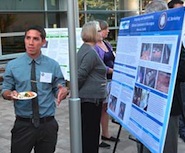By Roibín Ó hÉochaidh, UC Berkeley Media Relations
Last week, 32 undergraduates, many from CNR, shared experiences and adventures interning on myriad sustainability projects around the world during the second annual Cal Energy Corps symposium.
Launched in 2011, the Cal Energy Corps provides undergraduates with practical research and experiential-learning opportunities through internships with partner organizations across the academic, corporate and nonprofit sectors. Modeled on the U.S. Peace Corps, the program aims to engage Berkeley students tackling alternative energy, climate change and sustainability issues around the world.
Administered by the Office of the Vice Chancellor for Research, the program selected 32 students to participate this year. The program also expanded placement opportunities by partnering with new organizations, including industry giants Bosch, Siemens and Suntech.

The majority of student researchers worked on a broad range of sustainability projects across nine different countries and four continents – from installing water filtration and solar panels in coastal villages in Nicaragua to analyzing the global solar market in China, evaluating European energy policy strategies in Germany and transforming human waste into biodiesel in Ghana. Interns also headed to Brazil, Hong Kong, India, Singapore and Taiwan.
Several of this year’s cohort remained in the Bay Area, interning on projects to improve agricultural-crop characteristics at Berkeley’s Joint BioEnergy Institute, researching carbon-capture strategies at Lawrence Berkeley National Laboratory and developing novel battery technologies at Alameda-based startup Imprint Energy.
Mauricio Castillo (above), a senior majoring in conservation and resource studies, interned in Nicaragua with BlueEnergy, a sustainable-development nonprofit co-founded in 2003 by Berkeley alumnus Mathias Craig.
“Working so closely with the BlueEnergy team, I gained a real insight into rewards of development work and the challenges of running an NGO,” said Castillo, whose family comes from Nicaragua.
Working in the home of a local family that harvests wood from a distant forest for all its cooking and heating needs, Castillo designed, tested and installed an energy-efficient stove. The new stove will use up to 50 percent less wood and emit less smoke than the existing traditional open fire, expelling the most harmful particulates from the smoke-blackened kitchen through a new chimney.
“Every year, 2 million people die from the effects of smoke inhalation,” he explained. “It was really tough for me trying to work through all the smoke, so I can’t imagine what it’s like to have to do that everyday of your life.”
Read the full story on the UC Berkeley News Center.
